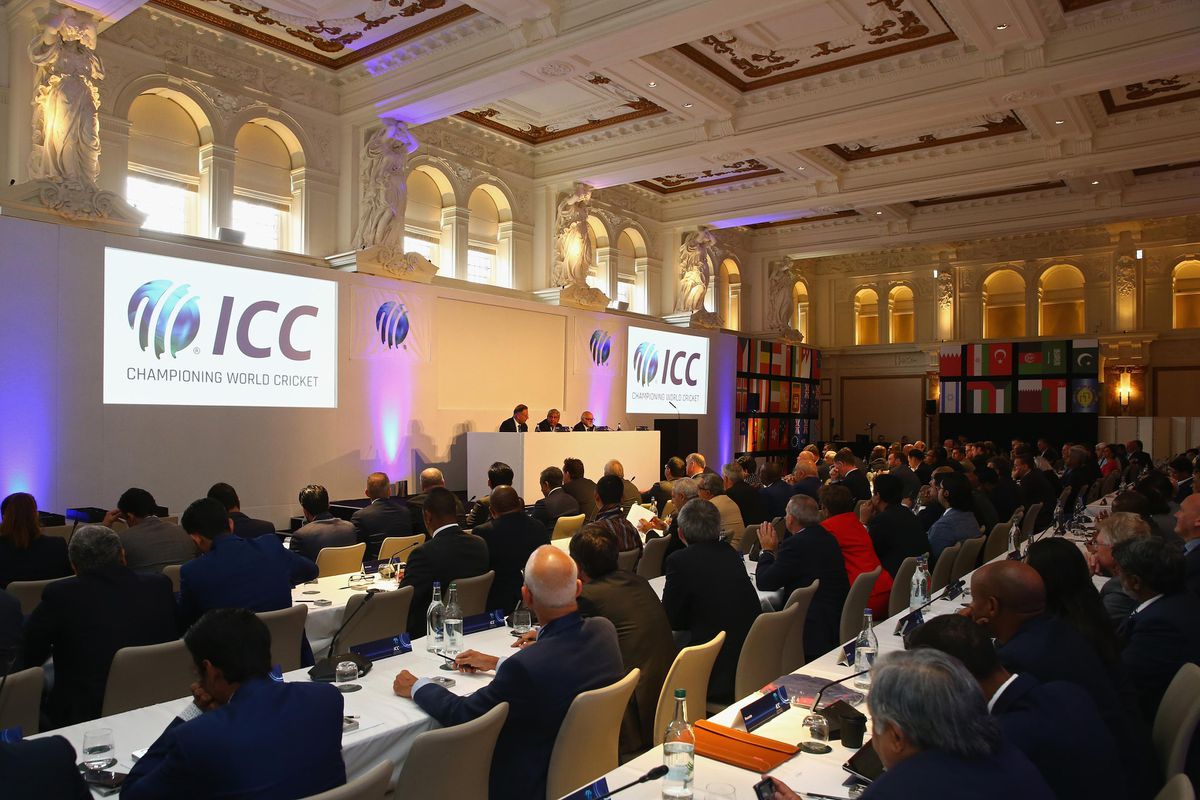[ad_1]

There is a power struggle amid the ICC’s board. (Photo by Steve Bardens-ICC/ICC via Getty Images)
Lost amid under-sieged boss Manu Sawhney’s tumult – seemingly fed extra fuel by the mighty Indian cricket body and its national media – an election last week was held for a coveted position on the influential International Cricket Council (ICC) Chief Executives’ Committee (CEC).
It’s understandable if you didn’t know about it. In trademark ICC secrecy, even insiders had been in the dark to when the by-election to replace new ICC board member Neil Speight would be held. This probably should not be surprising considering last year’s chair election dragged on interminably and the subsequent deputy chair battle was also held seemingly on a whim.
The ICC don’t seem to do transparency particularly well although most cricket fans don’t really care about the politicking from the suits and ties even though they should because the balance of power in the boardrooms affect what we see on field.
Sawhney, far from faultless in his short stint in the hot seat, is almost surely in a losing battle against an emboldened India, who were able to get their preferred chair candidate Greg Barclay over the line against Singaporean Imran Khwaja – a compatriot of the embattled chief executive.

Greg Barclay (L) defeated Imran Khwaja (R) for ICC chair. (Photo by Francois Nel/Getty Images)
India, along with fellow powers England and Australia, want the ICC’s current eight events for the 2023-31 cycle lowered to six to ensure there is enough space for their own lucrative domestic leagues and room to continually play each other in a loop.
That’s not good news for the rest, who are mostly facing battles of survival during these financially difficult times. Even though the ‘big three’ have the clout, a 2/3rds majority of the 17-person ICC board has to ratify any possible changes – whether it be the number of events in the next cycle or the removal of Sawhney, who still doesn’t appear likely to fall on his sword despite the pressure.
The board is divided as underlined by Khwaja’s tense 9-8 victory over surprise candidate Ricky Skerritt, the Cricket West Indies president, who was backed by the ‘big three’, according to sources.
As one insider told me, the new-look board is resembling a “hung parliament” with the Khwaja camp – who favor generating more funds to the ICC in a bid to provide a greater spread of revenue, which would help smaller Full Member nations and the Associates – being boosted in the Associates Member Directors election with the elevation of Speight, who is an ally of Khwaja.
To say the CEC’s by-election to replace Speight went under the radar would be a complete understatement – it was only publicly revealed when Uganda media reported its local cricket boss Bashir Ansasiira had been elected in a shock victory over well-known Betty Timmer, the Netherlands chair.
There was no media release on the result as the core cricket media, essentially entirely concentrated in India, were seemingly more interested in hastening Sawhney’s departure.

ICC CEO Manu Sawhney is under pressure. (Photo by Hagen Hopkins/Getty Images)
But Ansasiira’s victory is an interesting development even though it was considered a “stop gap election” by insiders with the CEC’s three Associate positions up for grabs in a mid-year election. The Uganda cricket boss won 21-18 over favored opponent Timmer, who some believe was more interested in developing the Netherlands than working for the greater Associates cause, according to sources.
It was the same perception that got Scotland’s Tony Brian, who was believed to have sided with Barclay in the chair election, unstuck in an important power swing on the ICC board.
The CEC is supposed to promote and develop cricket worldwide, while governing and regulating the sport at the international level.
Being on the CEC is a coveted role for Associates chiefs, who get to mix it with the top bosses from the Full Members. It is often seen as a stepping stone to get onto the ICC board as evidenced by the elevation of Speight and current CEC Associates representative Mark Stafford of Vanuatu narrowly falling short in the same contest.
Stafford, according to sources, is set to recontest mid-year and so is Ansasiira, who wants to be much more than a fill-in for a few months.
“Why not? I’m ambitious,” he said when I asked if he aimed to one day be on the ICC board.
“Changes I have made to Uganda cricket has seen it become a model in Africa. I want the Associates to work together and plan together.
“The question is – How we can add value to ICC, so we can be taken more serious by Full Members?”

Uganda is an emerging cricket country. (Photo by Joel Ford-ICC/ICC via Getty Images)
Ansasiira, who has earned respect through his pragmatic style of leadership, will get a head start to entrench himself before a much more heated battle takes place in a few months.
Strong candidates from some of the top Associates countries, according to sources, are expected to contest for the plum two-year positions.
Perhaps wider observers will be unaware but, most certainly, the ICC board will be watching closely.
[ad_2]
